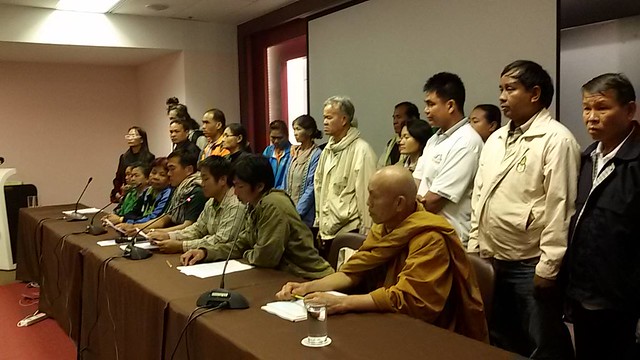Environmental and civil society groups condemned the new mining bill for ignoring environmental and health impacts and urged the junta government to stop deliberating the bill until Thailand has real representatives of the people.
More than 20 environmental and civil society organizations including the Enlaw Foundation, the Dao Din group, a student activist group based in Khon Kaen University in northeastern Thailand, and the Community Resource Centre (CRC) submitted a joint statement against the junta’s new mining bill last Friday to the Law Reform Commission of Thailand (LRCT).
The bill ignores the environmental consequences potentially caused by mines, which may have major health impacts on people living around mining areas, the groups stated.
The groups pointed out that the bill should not be passed before the election and that the new mining bill will benefit mining operators rather than people living in mining areas.
According to the bill, which has been proposed by the Department of Primary Industry and Mines (DPIM), the state shall assume sole ownership of the mines. Moreover, Environmental Impact Assessments (EIA) and Environmental Health Impact Assessments (EHIA) are not compulsory in the process of granting mining concessions. The new bill will also allow mining companies into mine protected forests.

Members of civil society and environmental organizations gather at the LRCT office on 22 January 2015 to issue a statement against the DPIM’s mining bill
Lerdsak Kamkongsak, an environmental activist and researcher based in the Northeast, told Prachatai that several articles of the new mining bill obviously show that the junta’s cabinet is giving a green light to mining corporates to raise the profit margins for shareholders as quickly and as much as possible regardless of the environmental and social costs.
The new mining bill is now being reviewed by the Council of State before being submitted to the National Legislative Assembly (NLA).
Prior to the groups’ announcement last Friday, the group and the LRCT met last Thursday to draft civil society’s version of the mining bill, which will be later submitted to the cabinet.
The Interim Charter, which was put in place after the coup in 2014, does not allow Thai citizens to propose any bill. Therefore, only the DPIM version of the mining bill is currently being sponsored by the junta cabinet.
In the statement, the group issued the following suggestions to the junta:
The Council of State should review the new mining bill by including opinions from civil society groups on the bill together with the civil society version.
The Prime Minister should order the Council of State to establish a sub-committee to review both the DPIM and civil society versions of the mining bill, which should be selected from members of the Council of State, DPIM personnel, members of the LRCT and the National Human Rights Commission (NRC), and civil society representatives.
After the first and second demands are met, the government should not propose the bill to the NLA until the new constitution is enacted and a parliament with an electoral mandate is established.

Since 2007, Prachatai English has been covering underreported issues in Thailand, especially about democratization and human rights, despite the risk and pressure from the law and the authorities. However, with only 2 full-time reporters and increasing annual operating costs, keeping our work going is a challenge. Your support will ensure we stay a professional media source and be able to expand our team to meet the challenges and deliver timely and in-depth reporting.
• Simple steps to support Prachatai English
1. Bank transfer to account “โครงการหนังสือพิมพ์อินเทอร์เน็ต ประชาไท” or “Prachatai Online Newspaper” 091-0-21689-4, Krungthai Bank
2. Or, Transfer money via Paypal, to e-mail address: [email protected], please leave a comment on the transaction as “For Prachatai English”
